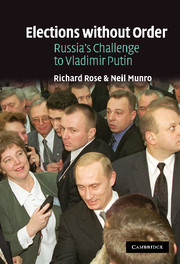Book contents
- Frontmatter
- Contents
- List of figures
- List of tables
- Introduction. The reality of Russia
- 1 A disorderly legacy
- 2 Democratization backwards
- 3 What Russians have made of transformation
- 4 Presidential succession: a Family problem
- 5 Parties without accountability
- 6 A floating system of parties
- 7 Impact of transformation on Duma voters
- 8 From acting to elected president
- 9 Campaigning and governing
- 10 In search of an equilibrium
- Appendix A New Russia Barometer samples
- Appendix B Coding of independent variables
- References
- Index
2 - Democratization backwards
Published online by Cambridge University Press: 22 September 2009
- Frontmatter
- Contents
- List of figures
- List of tables
- Introduction. The reality of Russia
- 1 A disorderly legacy
- 2 Democratization backwards
- 3 What Russians have made of transformation
- 4 Presidential succession: a Family problem
- 5 Parties without accountability
- 6 A floating system of parties
- 7 Impact of transformation on Duma voters
- 8 From acting to elected president
- 9 Campaigning and governing
- 10 In search of an equilibrium
- Appendix A New Russia Barometer samples
- Appendix B Coding of independent variables
- References
- Index
Summary
Free elections are good for blowing away the claim to rule of an undemocratic regime, but in the absence of a modern state they leave a void. The problem of Russia is not a problem of elections; it is that it lacks a modern state. For more than a century, the government of Russia has met the minimal definitional requirements of a state: its institutions monopolize the power of coercion within a given territory. But Russia has not been governed by a modern state, that is, a state that exercises its authority according to the rule of law. As the Russian folk saying has it, ‘The law is like a door in the middle of the field. You can go through it if you want, or you can go around it.’ Post-Soviet states are heirs to an anti-modern legacy. A World Bank (1997: 5, 35) survey found that Russia and other post-Soviet successor states ranked below the states of sub-Saharan Africa, Latin America, the Middle East and South and East Asia in the predictability and lawfulness of government.
The rule of law is the central characteristic of the modern state. It establishes order by setting out what governors and governed are free to do and imposing constraints on both. However, a big majority of countries introducing free elections in the past two decades have done so in the absence of a modern state.
- Type
- Chapter
- Information
- Elections without OrderRussia's Challenge to Vladimir Putin, pp. 41 - 60Publisher: Cambridge University PressPrint publication year: 2002



